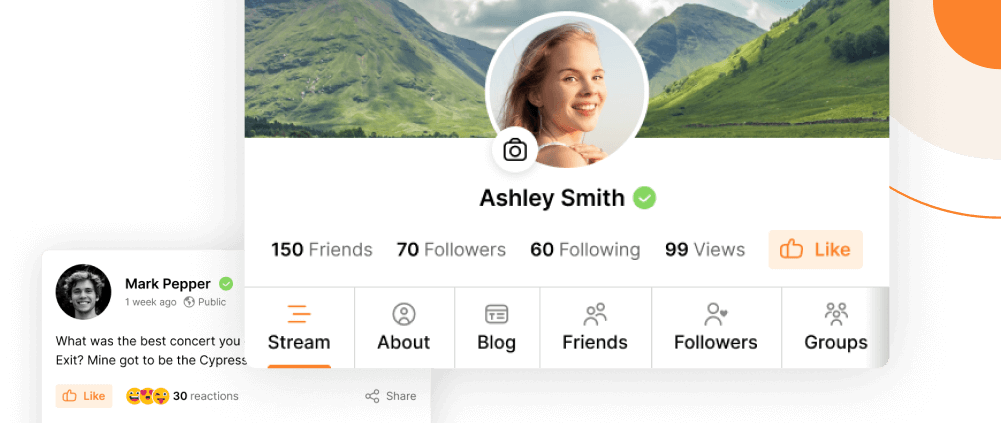Social interactions have vastly evolved ever since we were introduced to the power of the internet and it has changed our society forever.
We are able to connect with people all over the world, practically whenever we like, and exchange information, opinions, ideas, goods… The list becomes more and more populated with options thanks to the continuous development of technology. Communication is essentially a good thing that keeps people connected, and it can expand our knowledge as well as our businesses. Consequently, the more we are invested in online interaction, whether we seek entertainment or profit, the more we become aware of its trappings.
The biggest trap(ping) of all is human digitalization. Internet activities have become vastly more developed and attended than live activities. We spend a lot of our time engrossed in online communication, but that certainly doesn’t mean we’re not real people behind our displays. We are guided by certain principles and codes of conduct in real life, which should remain when we present ourselves on the internet. An online community – or social network, if you will – is the best example of implementing the “human” into “digital”, without forsaking the former while experiencing the latter.
Regardless of your technology or operational goals, the foundation of all change is fundamentally human.
Forbes
Before you decide to create a community of your own, you ought to give some serious thought to the human factor that will breathe life into it. Nowadays we are provided with the tools to start our own communities practically on the spur of a moment, but our effort and preparation are key in actually making it a place where people will want to come while pursuing their interest, and keep coming back.
Community Theme
The meaning of Community Theme can be twofold in this setting.
A theme originally represents an activity, interest, common ground where like-minded people will congregate. Your community may revolve around a hobby, such as cooking or gardening, or around pets – and even a certain type of pets, or fashion, or music, lifestyle, a cause, education, various types of businesses, the possibilities are practically endless. It is up to you to choose which one you wish to be dedicated to, according to your own interests and ambitions. You may want to start a social network that targets a certain subject, or to make it a hub for information. Your theme is your own, and once you decide on it, it will become the axis of your community.
Another meaning of the Theme is of a more technical nature, one that is widely recognized as the term itself: it pertains to the visual aspect. If you are developing a gaming community, you certainly wouldn’t go for kitchen utensils and food in the background. In other words, the appearance of your community’s home – your website – should remain faithful to its subject. A great solution for this important aspect is the Gecko Theme, included in every PeepSo Bundle for better convenience. Basically, it can fit into a theme of any type of website, with its unlimited color variations and smart arrangement. There is something to be said about the simplicity and efficiency of this setup, because it can provide a gorgeous, elaborate look with very little effort on your part.
People can be extremely visual; I’ve found that some can be entirely repelled by a website if they don’t feel comfortable within its visual setting, regardless how much its subject interests them. Making people feel at home is essential when you wish for their prolonged stay, as well as their return.
A very useful tip: You can further engage the members of your community by opening an ideas board, where they’ll be able to express their opinions and suggestions. People like having options and being included, and especially having the freedom to express themselves. This, however, doesn’t mean you shouldn’t set some boundaries – for everyone’s peace of mind.
Speaking of which…
Terms of Use and/or Guidelines
In order to make your community genuine, and ultimately legal, you should stay true to GDPR – General Data Protection Regulation. Respecting people’s privacy and personal data is paramount. Several lines that plainly describe this Regulation should be a part of every community’s Terms of Use. Your members will feel safe, they will actually be safe, and thus free to enjoy this sanctuary you’ve provided for them.
Other Terms that you might wish to outline for your members pertain to general behavior within the community. You may feel like a doting parent with a bunch of unruly kids at some point, but you can lessen this impression significantly if you initially set up rules for everyone to see. These rules are actually practical guidelines borrowed from real life, that can be easily overlooked while the vast freedom of the internet is exploited, and often misused.
Here are some examples:
- No double profiles
- No disrespect and name-calling
- No stealing other people’s content
- No trolling (yes, unfortunately this is a thing)
- No posting sensitive content (where you may specify what “sensitive” is)
- No underage members
- No posting ads
- Those who do not adhere to the Terms of Use will be immediately banned without a warning
And so on. Figure out the demands of your community, how you would like it to function, and implement them in your Terms of Use. It will be helpful if you additionally clarify every item on the list, so your members could have a better understanding of them, why they are there and how they work. Having clear and transparent Terms of Use will facilitate your job as a Community Manager or Administrator. That means less hassle with illicit behavior and more time for creative updates.
What Goes Where
I think you’d agree that if members were allowed to post what comes to their mind anywhere within the community, it would be sheer chaos. To avoid random posting and utter confusion, define places for different kinds of posts.
For your members’ musings and bursts of inspiration, Blog Section is perfect; you can integrate Blogs into your website with third-party plugins that are easy to use. Whether you will opt for paid or free Blog plugin is basically up to you, though there is something to be said about their application. If the subject of your website is inclined to lots of elaborate writing both from you and other users, or your blogs are dedicated to certain products your site features, you should consider a paid Blog plugin. It provides a multitude of options both technical and aesthetic, making your Blog Section stand out as an important factor in your community. However, if blogs are a convenient addition dedicated to random thoughts, or perhaps even extended guidelines and instructions on your part, I suggest the free Blog plugin that will do the job as well as the paid one, but with less (unnecessary) flare.
For certain focused topics within your community, Groups are ideal. Give your members direction in which they could express themselves to the fullest, depending on the nature of your website. Groups will also help them find more mutual interests and improve the overall communication within the community.
Having a Forum might boost communication, but implementing it isn’t necessary. Forums can get crowded and messy, individual threads tend to get lost in the sea of others and end up overlooked, and the very structure of a forum doesn’t contribute to straightforwardness. Forums also require appointed moderators who would have their hands full. Nowadays people are more likely to talk to each other directly, whether via personal messages or a chat room, or by commenting on individual posts on the Stream, or in Groups and Blogs, thus forming threads.
Including various helpful plugins and integrations in your website can greatly strengthen communication and enrich content distribution within the community.
Entertainment
Being a part of an online community is a form of entertainment in itself, but it’s often not enough. There will be days when posts, comments and general involvement will be scarce, and your members won’t feel so eager to linger there while the proverbial tumbleweed is rolling across the Stream. The causes for slow days may be various and hardly ever predictable. They usually have nothing to do with the functioning of your website, given there are plenty of external factors that can distract us. However, it doesn’t have to happen because of your lack of trying.
Encourage your members to entertain themselves by initially showing them how it’s done. Create a poll, a quiz, start a group about an important and/or complex topic, point out an interesting event, write a useful blog that will inspire your members to respond and then write their own stuff.
Enabling your members to find and create entertainment within your community works only if you’ve properly set up their playground.
Maintenance and profit
When we say “maintenance”, we primarily refer to the expenses of maintaining a website for the community. It almost always starts by funding it from your own pocket, but it won’t be sustainable in the long run – especially if the number of users starts to grow exponentially. It’s an investment, and every smart investment needs a plan which, at the very least, involves its return.
You can get your community members to involve themselves in the maintenance by making donations. For example, you can implement a donations system, and even write a helpful blog that explains its purpose.
If your community has grown and you wish to be more business-oriented, you can set up various membership levels. Membership plan applies mostly to bigger communities with content that pertains to different forms of transaction and/or service. This is the only setup where you can gain actual (and legit) profit, and even afford paid staff.
Another monetizing option is the inclusion of ads. Even if ads are targeted especially for the community’s purpose, they can get annoying. Including a membership plan that gets rid of ads can be a good trade-off.
Be There.
If you’re present in your community only when someone needs to be warned or to announce technical changes, well… you’re not much of a Community Manager. If you’re solely a Technical Admin, sure; you’re probably mostly poking around in the backend and keeping the cogs turning. But being there for your community means being involved in it as well.
Acting as a member as much as everyone else shows that you actually care, that you’re interested and participating. Knowing your community and how it works is extremely important and the only way to do so is to Be. There. I’m not saying you should constantly strive to post this and that whenever you perceive a “slow day”. Rather, be a subtle support and “your friendly neighborhood CM” who is super-easy to talk to and nearly always has a solution to a community-related problem… and if you don’t, you at least have some ideas where to start.
Your own attitude towards the community will inevitably contribute to its shaping. If you don’t feel the need to check in for a whole week, your members won’t either – perhaps even more so. They are practically under your care and a certain dose of responsibility is required on your part. Always keep in mind the purpose behind creating your own community and never lose sight of its importance, because nothing ever comes to part without a reason.
And last but not least – don’t forget to have fun! Whether you’re creating a social network for the sake of socializing, or striving to evolve your business, try to have fun while doing so. Organizing an online community doesn’t have to be a chore; instead, perceive it as something fulfilling, as it should be. People will definitely feel your enthusiasm through your effort, they will be drawn by it and they will appreciate the existence of a place where they can enjoy and develop their interests.




Reactions & comments
Comments